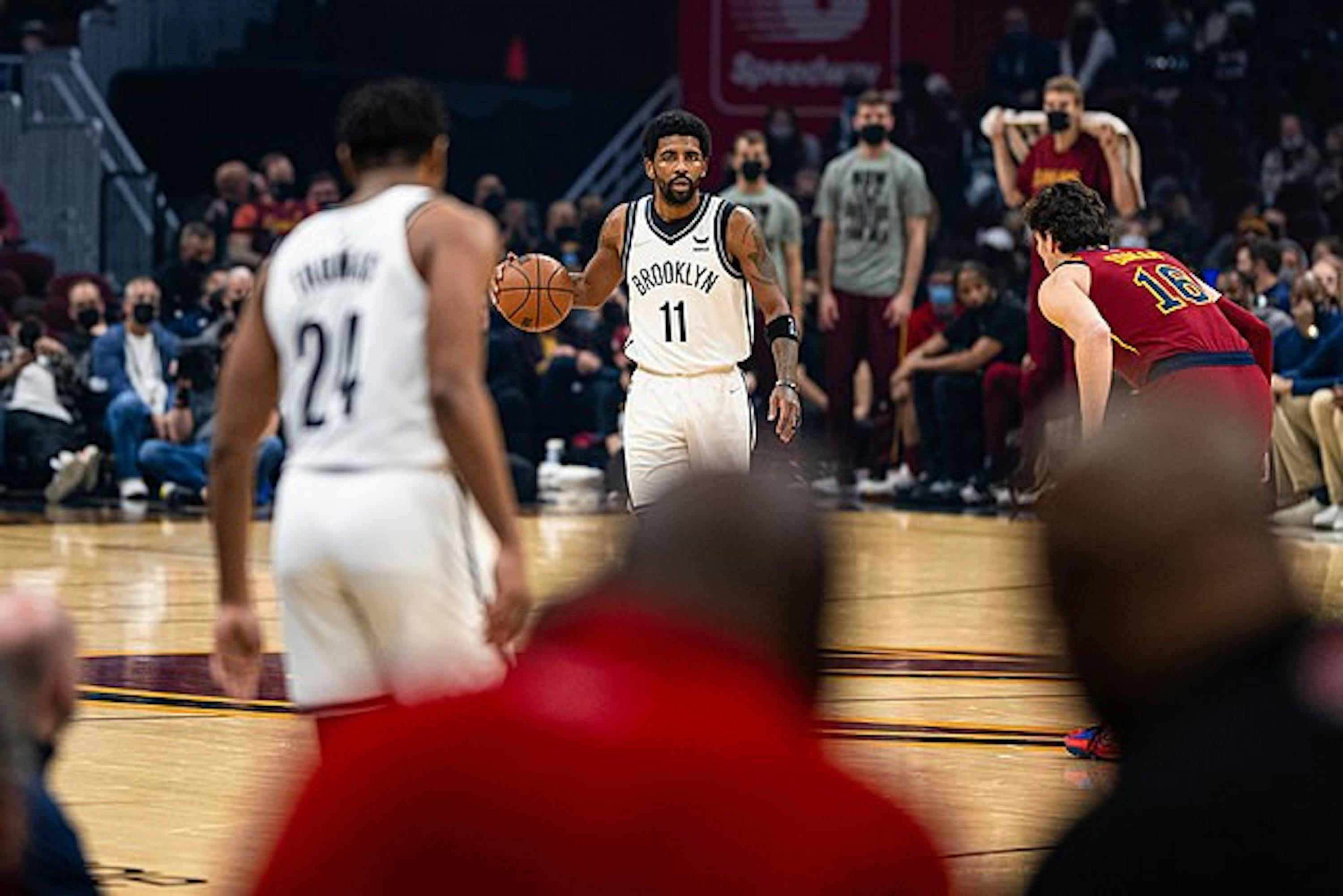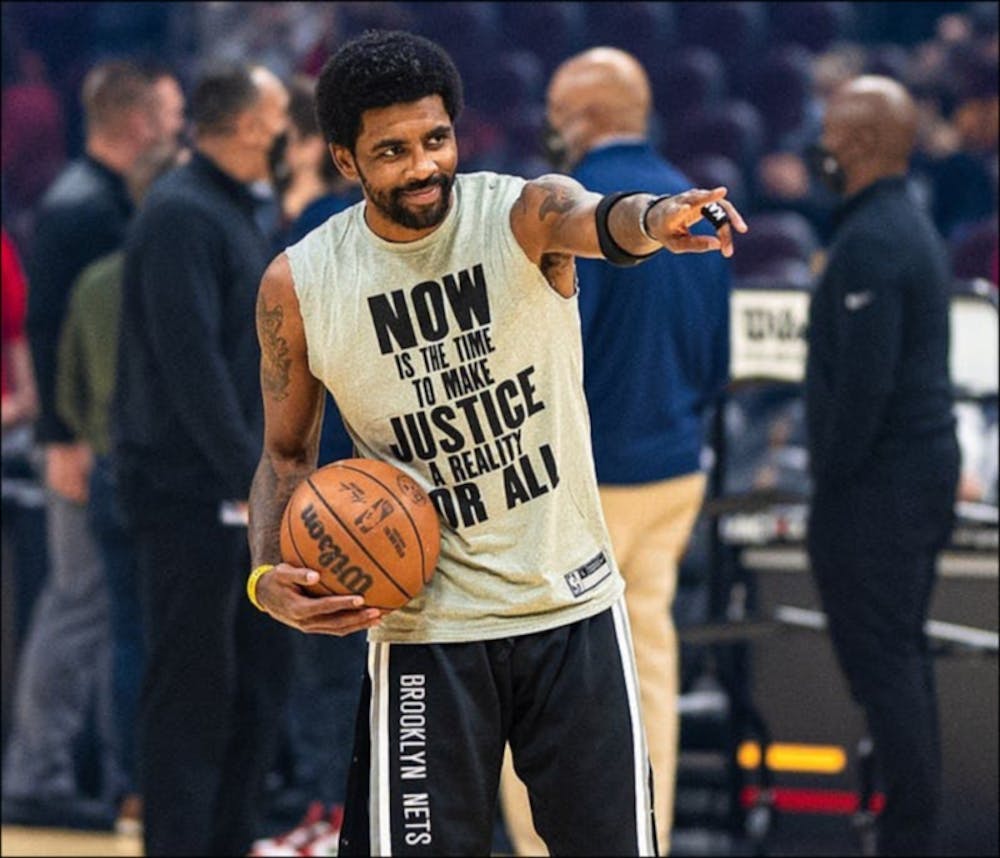
When Adrian Wojnarowski reported that Nets star Kyrie Irving wanted out of Brooklyn on Friday, Feb. 3, nobody should have been surprised. Since hitting arguably the most iconic shot in recent history, Irving’s career path has been predictably unpredictable.
His stint in Boston was short-lived and resulted in Celtics fans and management alike rejoicing at his departure. His time in Brooklyn produced exactly seven playoff wins, despite the initial hoopla surrounding the trio of Irving, Kevin Durant and now-Philadelphia 76ers guard James Harden. Tumult and disappointment follow Irving from destination to destination, and yet, the Dallas Mavericks elected to trade away valuable assets to get him.
It's imperative to know that the Mavericks traded from a position of desperation rather than strength. This desperation stems from their failure to surround transcendent superstar Luka Dončić with the requisite co-star to fully unlock his potential (or, in the case of Jalen Brunson, retain said co-star). Before the 2021–2022 National Basketball Association (NBA) season, the Mavericks had the opportunity to lock up Brunson for four years for $55 million.
They declined, and Brunson went on to have a career year, upping his scoring average from 12.6 points per game to 16.3 while maintaining above-average efficiency. In the playoffs, he elevated his game to another level by putting up 21.6 points per game and incentivizing the New York Knicks to offer him a four-year $104 million deal that the Mavericks were unable to match. As a result, the Mavericks felt that they had no choice but to make an offer for Irving or risk wasting another invaluable year of prime Dončić.
In the deal, they parted ways with dependable wing Dorian Finney-Smith. Finney-Smith has regularly defended the opposing team’s best player at a high level and has become an increasingly adept offensive player. Initially a non-factor on offense, Finney-Smith has added a dependable three-pointer to his arsenal. Coming into the league, Finney-Smith was at 29% accuracy, but over the last three years, he has shot it at league average or above, with percentages of 37%, 39% and 39%, respectively. This speaks to his dedication to get better, and one must wonder whether he could act as a secondary or tertiary ball-handler in the future. It's certainly conceivable with his apparent track record of improvement since entering the league.
The Mavericks also traded away journeyman (he’s been on five teams in eight years!) Spencer Dinwiddie, who has quietly been having an excellent year playing alongside Dončić. All Dinwiddie knows is go, which is perhaps why he has been such a great fit next to Dončić.
Regularly drawing traps and double teams, Dončić swings the ball and leaves defenses scrambling and in disarray. An offensive player who can make quick decisions benefits the most next to Dončić, as they can maximize this advantage before the defense has the opportunity to recover.
One such offensive player is Irving, who has a track history succeeding next to a high-usage, on-ball creators like Dončić. Certainly, Mavericks executives examined Irving’s time in Cleveland as a projection for what his fit may be in Dallas.

Playing next to LeBron James, Irving was an ideal partner due to his ability to get downhill quickly and play off the advantages James created, whether in isolation or in the pick-and-roll. Such a cerebral player, Irving is a savant at finding creases in set defenses and exploiting them with his imaginative handle and expert shot-making. Against a scrambling defense, they are completely at Irving’s mercy, and it is not hyperbolic to assume that Irving can get whatever shot he wants, either for himself or his teammates.
Innately, this threat will prevent defenses from devoting ample attention to Dončić, allowing him to operate against single coverage and standard pick-and-roll coverages, which he has been doing since he was a teenager playing in the EuroLeague.
It’s difficult to emphasize how effortlessly Dončić scores in one-on-one situations. Toronto Raptors star point guard Fred VanVleet said it best on The Old Man and the Three podcast.
“I can’t believe nobody’s doubled him. I mean, like, if you don’t double him it's 50,” VanVleet said.

That’s what makes this trade so difficult to evaluate. On one hand, it appears the Mavericks made a colossal mistake in an effort to compensate for a previous colossal mistake. In addition to giving up Finney-Smith and Dinwiddie, they sent the Nets significant draft capital in an unprotected 2029 first-round pick and two future second-round picks.
Picks so far in the future, such as in 2029, are especially risky because there is no telling who will be on the team at that point. There is also no guarantee that Irving resigns in the offseason or will play three months straight without causing controversy. On the other hand, it is easy to imagine Irving seamlessly fitting in next to Dončić and the Mavericks going on a deep run in the playoffs. The West is wide open, and with the exception of the Denver Nuggets, an argument could be made that no team will have better consistent shot creation for 48 straight minutes than the Mavericks.
The Mavericks had to show Dončić that they are determined to surround him with talent. They had no choice. Their hands were tied, and now they’ll be relying on Irving to cut them loose.





